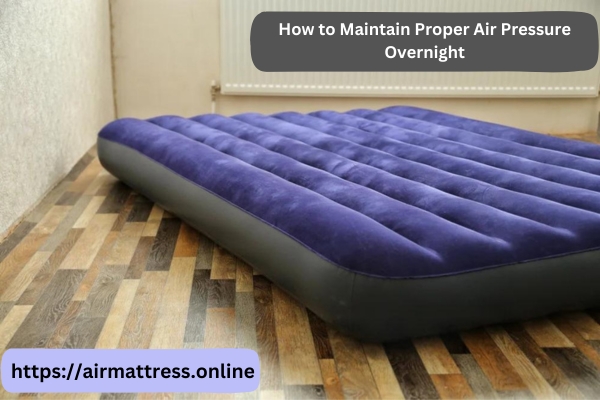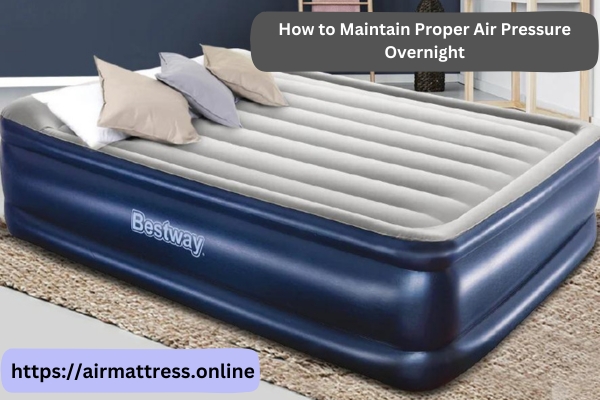How to Maintain Proper Air Pressure Overnight
Maintaining proper air pressure in your tires is essential for optimal vehicle performance, safety, and fuel efficiency. However, many people overlook the importance of maintaining air pressure overnight.
In this article, we’ll explore effective methods to ensure that your tires stay properly inflated throughout the night. By following these tips, you can extend the lifespan of your tires and enjoy a smoother, more efficient ride. (Buy On Amazon)
1. Start with the Right Tire Pressure:
Before addressing overnight air pressure maintenance, it’s crucial to start with the correct tire pressure. Refer to your vehicle’s owner’s manual or the sticker on the driver’s side door jamb to find the recommended tire pressure.
Use a reliable tire pressure gauge to check and adjust the pressure accordingly. Starting with the proper tire pressure is the foundation for maintaining it overnight.
2. Monitor Tire Pressure Regularly:
To maintain air pressure overnight, it’s important to monitor your tire pressure regularly. Invest in a quality tire pressure gauge and check your tire pressure at least once a month or before long trips.
Keep in mind that external factors such as temperature changes can affect tire pressure, so monitor it more frequently during extreme weather conditions.
3. Inflate Tires to the Recommended Pressure:
If your tires are underinflated before parking your vehicle overnight, make sure to inflate them to the recommended pressure. An accurate tire pressure gauge and an air compressor or a nearby gas station with an air pump can help you achieve the desired pressure. Aim for the recommended pressure, not the maximum pressure indicated on the tire sidewall.
4. Park in a Suitable Environment:
Choosing the right parking spot can make a significant difference in maintaining proper tire pressure overnight. Whenever possible, park your vehicle in a shaded area or a garage.
Excessive exposure to sunlight and extreme heat can cause air pressure to increase, leading to overinflated tires. Additionally, avoid parking near sharp objects or debris that could puncture your tires.
5. Be Mindful of Temperature Changes:
Temperature fluctuations can affect tire pressure, especially during colder months. As the temperature drops, tire pressure tends to decrease. To counteract this, inflate your tires slightly above the recommended pressure to compensate for the anticipated drop overnight. However, avoid overinflating, as it can lead to uneven tire wear and reduced traction.
6. Consider Nitrogen Inflation:
Nitrogen inflation is an alternative to regular air inflation for tires. Nitrogen molecules are larger and less prone to leakage compared to oxygen molecules found in regular air.
Nitrogen-filled tires tend to maintain pressure longer, including overnight, reducing the risk of underinflation. Many tire shops and service centers offer nitrogen inflation services.

7. Regularly Inspect for Leaks:
Leakage can cause gradual air pressure loss in your tires. Inspect your tires regularly for any signs of leaks, such as visible punctures, cracks, or damage to the valve stem.
Additionally, pay attention to any persistent loss of air pressure, which may indicate a leak. If you notice any issues, have them addressed promptly to maintain proper air pressure.
8. Invest in Tire Pressure Monitoring System (TPMS):
Consider installing a Tire Pressure Monitoring System (TPMS) in your vehicle. A TPMS constantly monitors your tire pressure and alerts you if it falls below the recommended level.
This real-time information can help you identify and address any tire pressure issues promptly, ensuring your tires remain properly inflated overnight and beyond.
Conclusion:
Maintaining proper air pressure in your tires overnight is crucial for vehicle performance and safety.
By following these tips, including regular monitoring, proper inflation, suitable parking, temperature awareness, and leak inspections, you can ensure that your tires maintain the correct air pressure while parked.
Remember, maintaining optimal tire pressure not only improves fuel efficiency but also extends the lifespan of your tires, saving you money in the long run and providing a safer driving experience.

